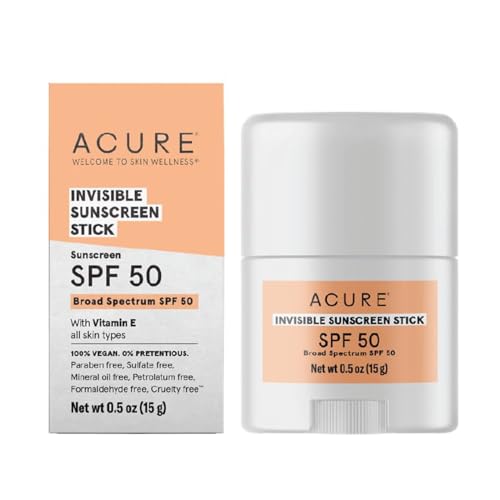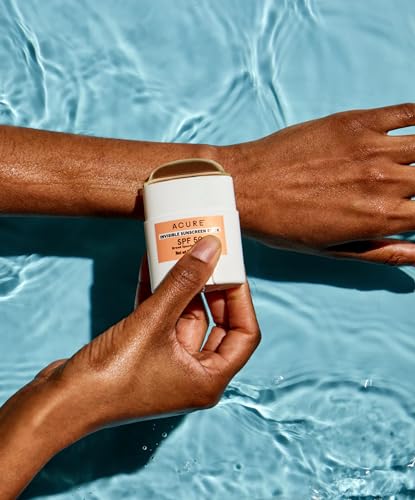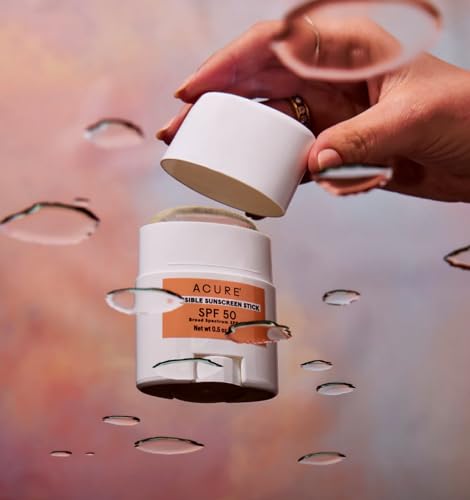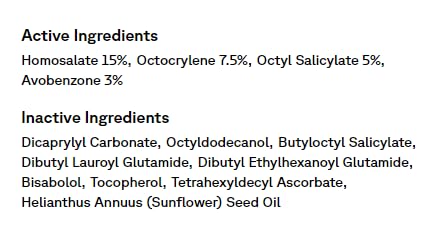



Acure Sunscreen Stick SPF 50 - Broad Spectrum Protection, Nourishing Botanicals - 0.5 oz


Bisabolol
Medium RiskBisabolol is a scent ingredient naturally occurring in various plants, particularly in chamomile. It is primarily used in cosmetics for its fragrance and potential skin-soothing properties, contributing to the overall sensory experience of personal care products.
Sustai Insights
Bisabolol offers functional benefits as a fragrance component and may provide skin-soothing effects. It is generally recognized for its low carcinogenic risk and low developmental toxicity, though moderate concerns exist regarding allergy potential. Bisabolol is also subject to certain restrictions in verified products. Environmental impacts are minimal, but it should be used with caution in sensitive populations. Overall, it poses a medium risk level based on current scientific understanding.
Butyloctyl Salicylate
Medium RiskButyloctyl salicylate is a synthetic compound often used in cosmetic formulations for its ability to enhance skin absorption and stability of products. It primarily functions as a UV filter, providing protection against harmful sun rays in various personal care items.
Sustai Insights
Butyloctyl salicylate offers functional benefits as a UV filter and enhances skin absorption in formulations. However, it is associated with moderate usage restrictions due to potential health risks such as skin irritation and concerns regarding enhanced absorption. Environmental considerations include its pollutant potential, though it is not highly bioaccumulative. Regulatory bodies have placed limitations on its use in certain products, reflecting a medium risk assessment overall. Safe usage practices are advisable, and alternatives like natural UV filters may be considered.
Dicapryl Carbonate
Low RiskDicapryl carbonate is an ester derived from caprylic acid and carbonic acid. It is used primarily as an emollient and skin conditioning agent in cosmetic formulations, providing a smooth and soft feel to the skin.
Sustai Insights
Dicapryl carbonate serves as an effective emollient, enhancing the texture of skincare products. It is biodegradable and sustainably sourced, contributing positively to environmental sustainability. Health risks are minimal, with low concerns for cancer, allergies, or reproductive toxicity. There are no significant environmental hazards associated with its use, and it is not subject to regulatory restrictions. Overall, the ingredient presents a low risk profile, making it a favorable choice in cosmetic applications.
Dibutyl Lauroyl Glutamide
Low RiskDibutyl lauroyl glutamide is a substituted glutamic acid derivative commonly used as a surfactant and emulsifier in cosmetic formulations. It aids in stabilizing products by enhancing texture and solubility, contributing to overall formulation efficacy.
Sustai Insights
Dibutyl lauroyl glutamide offers functional benefits as an emulsifier, improving product stability and texture. It is considered low-risk regarding health concerns such as carcinogenicity, allergies, and reproductive toxicity. Environmentally, it does not contribute significantly to pollution or bioaccumulation. Regulatory bodies have not issued significant warnings, supporting its low-risk classification. Safe usage practices should be followed, with no notable alternatives reported. Overall, the ingredient scores low on risk assessments.
Octyldodecyl Ricinoleate
Low RiskOctyldodecyl ricinoleate is an ester of octyldodecanol and ricinoleic acid, primarily used as an emollient in cosmetic formulations. It functions to improve the texture and spreadability of products, providing a smooth feel upon application.
Sustai Insights
Octyldodecyl ricinoleate offers effective emollient properties that enhance product texture and skin feel. It is derived from ricinoleic acid, which is often sustainably sourced. Health risks are low, with no significant concerns regarding carcinogenicity, allergies, or reproductive toxicity. Environmental impacts are minimal, and regulatory status is compliant with safety standards. Overall, it is assessed as low risk, making it a suitable ingredient for cosmetic use.
Tetrahexyldecyl Ascorbate
Low RiskTetrahexyldecyl ascorbate is an ester of hexyl ascorbic acid, a stable form of vitamin C, commonly used in cosmetic formulations for its antioxidant properties. It is employed to improve skin appearance, enhance radiance, and provide photoprotection.
Sustai Insights
Tetrahexyldecyl ascorbate offers functional benefits as an antioxidant, promoting skin health and appearance. It is generally regarded as safe, with low concerns for carcinogenicity, allergies, and irritation. Although it poses minimal environmental risks, regulatory bodies have outlined specific usage guidelines. Overall, its risk level is assessed as low, making it a viable option in cosmetic formulations.
Helianthus Annuus (Sunflower) Seed
Low RiskHelianthus annuus (sunflower) seed is derived from the seeds of the sunflower plant and is commonly used in various cosmetic and personal care products. It serves primarily as an emollient and skin conditioning agent, providing moisture and enhancing the texture of formulations.
Sustai Insights
Helianthus annuus (sunflower) seed offers functional benefits, including skin conditioning and moisturizing properties, while being sustainably sourced and biodegradable. Health risks are minimal, with low concerns for carcinogenicity, allergies, and reproductive toxicity. Environmentally, it presents low risks of pollution or bioaccumulation. Regulatory assessments indicate no current restrictions. Overall, it is considered a low-risk ingredient, and safe usage practices should be maintained. Alternative ingredients may include other plant-based oils, but the sunflower seed oil remains a viable option.
Dibutyl Ethylhexanoyl Glutamide
Low RiskDibutyl ethylhexanoyl glutamide is a synthetic compound primarily used in cosmetic formulations as a surfactant and emulsifier. It helps to improve the texture and stability of products, facilitating the blending of oil and water-based ingredients.
Sustai Insights
Dibutyl ethylhexanoyl glutamide exhibits low health risks, with negligible concerns regarding carcinogenicity, allergies, or reproductive toxicity. Environmentally, it is not classified as a pollutant or bioaccumulative. Regulatory assessments indicate no current restrictions. Overall, it presents a low risk profile, supporting safe usage in formulations with appropriate practices. Alternatives may include naturally derived emulsifiers for those seeking greener options.
Tocopherol, D Alpha
Low RiskTocopherol, specifically d-alpha tocopherol, is a naturally occurring form of Vitamin E. It is commonly used in cosmetic and personal care products primarily for its antioxidant properties, helping to protect formulations from oxidation and extend shelf life.
Sustai Insights
D-alpha tocopherol provides effective antioxidant benefits, contributing to product stability. It is sustainably sourced and generally regarded as safe, with low concerns regarding carcinogenicity, allergies, and reproductive toxicity. However, there are minor concerns about endocrine disruption. Regulatory bodies have not imposed significant restrictions, indicating low overall risk. Recommended usage practices include adhering to established safe concentration thresholds. Alternatives, such as other forms of Vitamin E or plant-based antioxidants, may also be considered.
Dicapryl Carbonate
Low RiskDicapryl carbonate is an ester derived from caprylic acid and carbonic acid. It is used primarily as an emollient and skin conditioning agent in cosmetic formulations, providing a smooth and soft feel to the skin.
Sustai Insights
Dicapryl carbonate serves as an effective emollient, enhancing the texture of skincare products. It is biodegradable and sustainably sourced, contributing positively to environmental sustainability. Health risks are minimal, with low concerns for cancer, allergies, or reproductive toxicity. There are no significant environmental hazards associated with its use, and it is not subject to regulatory restrictions. Overall, the ingredient presents a low risk profile, making it a favorable choice in cosmetic applications.
Dibutyl Lauroyl Glutamide
Low RiskDibutyl lauroyl glutamide is a substituted glutamic acid derivative commonly used as a surfactant and emulsifier in cosmetic formulations. It aids in stabilizing products by enhancing texture and solubility, contributing to overall formulation efficacy.
Sustai Insights
Dibutyl lauroyl glutamide offers functional benefits as an emulsifier, improving product stability and texture. It is considered low-risk regarding health concerns such as carcinogenicity, allergies, and reproductive toxicity. Environmentally, it does not contribute significantly to pollution or bioaccumulation. Regulatory bodies have not issued significant warnings, supporting its low-risk classification. Safe usage practices should be followed, with no notable alternatives reported. Overall, the ingredient scores low on risk assessments.
Bisabolol
Medium RiskBisabolol is a scent ingredient naturally occurring in various plants, particularly in chamomile. It is primarily used in cosmetics for its fragrance and potential skin-soothing properties, contributing to the overall sensory experience of personal care products.
Sustai Insights
Bisabolol offers functional benefits as a fragrance component and may provide skin-soothing effects. It is generally recognized for its low carcinogenic risk and low developmental toxicity, though moderate concerns exist regarding allergy potential. Bisabolol is also subject to certain restrictions in verified products. Environmental impacts are minimal, but it should be used with caution in sensitive populations. Overall, it poses a medium risk level based on current scientific understanding.
Octyldodecyl Ricinoleate
Low RiskOctyldodecyl ricinoleate is an ester of octyldodecanol and ricinoleic acid, primarily used as an emollient in cosmetic formulations. It functions to improve the texture and spreadability of products, providing a smooth feel upon application.
Sustai Insights
Octyldodecyl ricinoleate offers effective emollient properties that enhance product texture and skin feel. It is derived from ricinoleic acid, which is often sustainably sourced. Health risks are low, with no significant concerns regarding carcinogenicity, allergies, or reproductive toxicity. Environmental impacts are minimal, and regulatory status is compliant with safety standards. Overall, it is assessed as low risk, making it a suitable ingredient for cosmetic use.
Tetrahexyldecyl Ascorbate
Low RiskTetrahexyldecyl ascorbate is an ester of hexyl ascorbic acid, a stable form of vitamin C, commonly used in cosmetic formulations for its antioxidant properties. It is employed to improve skin appearance, enhance radiance, and provide photoprotection.
Sustai Insights
Tetrahexyldecyl ascorbate offers functional benefits as an antioxidant, promoting skin health and appearance. It is generally regarded as safe, with low concerns for carcinogenicity, allergies, and irritation. Although it poses minimal environmental risks, regulatory bodies have outlined specific usage guidelines. Overall, its risk level is assessed as low, making it a viable option in cosmetic formulations.
Helianthus Annuus (Sunflower) Seed
Low RiskHelianthus annuus (sunflower) seed is derived from the seeds of the sunflower plant and is commonly used in various cosmetic and personal care products. It serves primarily as an emollient and skin conditioning agent, providing moisture and enhancing the texture of formulations.
Sustai Insights
Helianthus annuus (sunflower) seed offers functional benefits, including skin conditioning and moisturizing properties, while being sustainably sourced and biodegradable. Health risks are minimal, with low concerns for carcinogenicity, allergies, and reproductive toxicity. Environmentally, it presents low risks of pollution or bioaccumulation. Regulatory assessments indicate no current restrictions. Overall, it is considered a low-risk ingredient, and safe usage practices should be maintained. Alternative ingredients may include other plant-based oils, but the sunflower seed oil remains a viable option.
Dibutyl Ethylhexanoyl Glutamide
Low RiskDibutyl ethylhexanoyl glutamide is a synthetic compound primarily used in cosmetic formulations as a surfactant and emulsifier. It helps to improve the texture and stability of products, facilitating the blending of oil and water-based ingredients.
Sustai Insights
Dibutyl ethylhexanoyl glutamide exhibits low health risks, with negligible concerns regarding carcinogenicity, allergies, or reproductive toxicity. Environmentally, it is not classified as a pollutant or bioaccumulative. Regulatory assessments indicate no current restrictions. Overall, it presents a low risk profile, supporting safe usage in formulations with appropriate practices. Alternatives may include naturally derived emulsifiers for those seeking greener options.
Tocopherol, D Alpha
Low RiskTocopherol, specifically d-alpha tocopherol, is a naturally occurring form of Vitamin E. It is commonly used in cosmetic and personal care products primarily for its antioxidant properties, helping to protect formulations from oxidation and extend shelf life.
Sustai Insights
D-alpha tocopherol provides effective antioxidant benefits, contributing to product stability. It is sustainably sourced and generally regarded as safe, with low concerns regarding carcinogenicity, allergies, and reproductive toxicity. However, there are minor concerns about endocrine disruption. Regulatory bodies have not imposed significant restrictions, indicating low overall risk. Recommended usage practices include adhering to established safe concentration thresholds. Alternatives, such as other forms of Vitamin E or plant-based antioxidants, may also be considered.
Butyloctyl Salicylate
Medium RiskButyloctyl salicylate is a synthetic compound often used in cosmetic formulations for its ability to enhance skin absorption and stability of products. It primarily functions as a UV filter, providing protection against harmful sun rays in various personal care items.
Sustai Insights
Butyloctyl salicylate offers functional benefits as a UV filter and enhances skin absorption in formulations. However, it is associated with moderate usage restrictions due to potential health risks such as skin irritation and concerns regarding enhanced absorption. Environmental considerations include its pollutant potential, though it is not highly bioaccumulative. Regulatory bodies have placed limitations on its use in certain products, reflecting a medium risk assessment overall. Safe usage practices are advisable, and alternatives like natural UV filters may be considered.
Experience the perfect blend of sun protection and nourishment with Acure Invisible Sunscreen Stick SPF 50. This sheer dry oil stick combines broad spectrum protection against UVA & UVB rays with Vitamin E, leaving your skin with a fresh, dewy glow. Ideal for all skin types, this 100% vegan sunscreen is the perfect travel companion for sun lovers who care about their skin and the environment.
- Broad Spectrum Protection: Shields skin from harmful UVA and UVB rays while enhancing your natural glow.
- Vitamin E Enriched: Infused with Vitamin E to nourish and hydrate skin, keeping it healthy and radiant.
- Reef Safe Formula: Gentle on the planet, this sunscreen is designed to be reef-friendly, ensuring your sun protection is sustainable.
- Travel-Friendly Size: Compact design makes it easy to toss in your bag for on-the-go application, perfect for beach days or outdoor adventures.
- Free from Harmful Chemicals: Crafted without parabens, sulfates, or mineral oils, prioritizing your skin’s wellness while being ethically produced.
Subscribe & Save with Sustai
- Best Price Guarantee: Always enjoy the lowest prices on sustainable home essentials.
- No Surprises: We’ll notify you before shipping. No hidden fees, ever.
- You’re in Charge: Change, pause, or cancel your subscription anytime with ease.
- Eco-Friendly Deliveries: Our grouped shipments mean less packaging and lower emissions.
Join us on a sustainable journey. Special offers for a limited time! Prices and promotions may change.
Recommended Products
Experience the perfect blend of sun protection and nourishment with Acure Invisible Sunscreen Stick SPF 50. This sheer dry oil stick combines broad spectrum protection against UVA & UVB rays with Vitamin E, leaving your skin with a fresh, dewy glow. Ideal for all skin types, this 100% vegan sunscreen is the perfect travel companion for sun lovers who care about their skin and the environment.
- Broad Spectrum Protection: Shields skin from harmful UVA and UVB rays while enhancing your natural glow.
- Vitamin E Enriched: Infused with Vitamin E to nourish and hydrate skin, keeping it healthy and radiant.
- Reef Safe Formula: Gentle on the planet, this sunscreen is designed to be reef-friendly, ensuring your sun protection is sustainable.
- Travel-Friendly Size: Compact design makes it easy to toss in your bag for on-the-go application, perfect for beach days or outdoor adventures.
- Free from Harmful Chemicals: Crafted without parabens, sulfates, or mineral oils, prioritizing your skin’s wellness while being ethically produced.

You can have at most 2 Sustainable Steals products in your cart
Customer Reviews
Customers’ View
Customers appreciate the Acure Invisible Sunscreen Stick for its effective sun protection and user-friendly application. Many users highlight its smooth texture and the fact that it goes on clear, making it suitable for sensitive skin and ideal for on-the-go reapplications. A common sentiment is that a little product goes a long way, enhancing its convenience despite the small size. Environmentally conscious consumers value its reef-safe formula and the absence of harsh chemicals, with several reviewers noting its vegan and cruelty-free credentials. However, some customers express concerns about the product's size in relation to its price and warn of its sensitivity to heat. Overall, the sunscreen stick is seen as a practical, eco-friendly choice for sun protection.
AI-generated from the text of customer reviewsThis product is rated 4.6 of 5.0 stars.
It has received 25 reviews.




